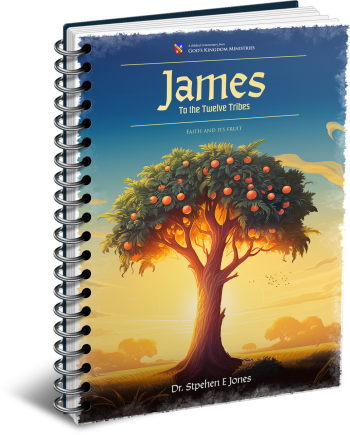Latest Posts
View the latest posts in an easy-to-read list format, with filtering options.

Many in the past have wrestled with the supposed conflict between James and Paul over the issue of law and faith. Both agree that faith needs "fruit" to be considered genuine. Spiral bound book.
Category - Bible Commentaries

In James 2:1 we read,
1 My brethren, do not hold your faith in our glorious Lord Jesus Christ with an attitude of personal favoritism. (NASB)
The NASB translators did not seem to understand the mind of James very well. By translating prosopolepsia to mean “personal favoritism,” they tend to trivialize James' intent. There is nothing petty about this, nor is the issue merely about personal choices in life. The NASB actually did a much better job when they translated the same word in Romans 2:11, where it reads,
11 For there is no partiality with God.
Both James and Paul used the term in their comments on the divine law, which forbids judges to show partiality in judgment. The foundation of the law is love and justice, both applied impartially so as not to violate the rights of anyone. Moses tells us in Deut. 1:16, 17,
16 Then I charged your judges at that time, saying, “Hear the cases between your fellow countrymen and judge righteously between a man and his fellow countryman, or the alien who is with him. 17 You shall not show partiality in judgment; you shall hear the small and the great alike. . .”
To be impartial in judgment means having no double standards, as Moses tells us in Lev. 24:22,
22 There shall be one standard [mishpat, “judgment”] for you; it shall be for the stranger as well as the native, for I am the Lord your God.
Again, Moses tells us in Num. 15:15 and 16,
15 As for the assembly [church], there shall be one statute for you and for the alien who sojourns with you, a perpetual statute [chuqqah] throughout your generations; as you are, so shall the alien be before the Lord. 16 There is to be one law [torah] and one ordinance [mishpat] for you and for the alien who sojourns with you.
God was obviously very concerned about equal justice for all, particularly because of the multitude of Egyptians and other aliens who came out of Egypt with the Israelites and who were thus equal citizens in the new Kingdom.
Equal justice for all is also linked to the law of equal weights and measures in Lev. 19:34-36.
34 The stranger who resides with you shall be to you as the native among you, and you shall love him as yourself; for you were aliens in the land of Egypt; I am the Lord your God. 35 You shall do no wrong in judgment, in measurement of weight or capacity. 36 You shall have just balances, just weights, a just ephah, and a just hin….
Hence, the spiritual meaning of a “just balance” is that the law must be applied impartially to all men. Judges were not to have two laws or use double standards in measuring righteousness and sin. Moses gave specific instructions to judges in Exodus 23:1-9. He was concerned about judges pandering to the majority, rather than judging according to the law of God. Exodus 23:2 says,
2 You shall not follow a multitude in doing evil, nor shall you testify in a dispute so as to turn aside after a multitude in order to pervert justice.
Moses was even concerned about the rights of the wealthy. A poor man does not have the right to take property from a rich man unless it is a restitution payment. Likewise, the wealthy deserve equal justice, for Exodus 23:3 says,
3 Nor shall you be partial to a poor man in his dispute.
Injustice in this area is seen today in the welfare laws, where the judges (government) have seen fit to tax the rich in order to give to the poor. It is not the duty of divine government to steal from the rich and give to the poor. It is instead the duty of every man to love one another and to discern when to give voluntarily to help those who are in need. When men are forced to give to the poor, as done by modern Socialist governments, it is simply legalized theft in the eyes of God.
These are the laws that James had studied for his entire life, and these laws are his reference point for his statements in the second chapter of his letter about showing partiality. By knowing the mind of James, we can understand his intent and learn his instructions properly.
2 For if a man comes into your assembly with a gold ring and dressed in fine clothes, and there also comes in a poor man in his dirty clothes, 3 and you pay special attention to the one who is wearing the fine clothes, and say, “You sit here in a good place,” and you say to the poor man, “You stand over there, or sit down by my footstool,” 4 have you not made distinctions among yourselves, and become judges with evil motives?
Having met many ministers over the years, I have heard many stories about how this instruction has been violated. I heard of one minister of a well-known mega-church who instructs his ushers to move certain people out of the front rows, because they did not fit the prosperous image of the church. He did not want them to be so visible to the world as the television cameras panned the audience.
My friend Shelli, who was once a worship leader, dressed up as a “bag lady” one Sunday and came to church to see how people would react. Her costume was so creative, realistic, and smelly that no one recognized her. They all avoided her and wished she would go away and never come back.
Perhaps they missed the lesson of James 2:2. It is easy to claim to have the love of God, but a little harder to be an impartial doer of the word.
The law is concerned with being doers of the word to prove what really lies within our hearts. James continues,
5 Listen, my beloved brethren: did not God choose the poor of this world to be rich in faith and heirs of the kingdom which He promised to those who love Him? 6 But you have dishonored [atimazo, “shamed, insulted, treated with contempt”] the poor man.
I have known men who thought that poverty was self-imposed by not practicing the prosperity doctrine. Some try to help, but others are afflicted with spiritual pride and simply despise the poor. They do not realize that God has created poor people to give the rich an opportunity to be tested in this area of life. If there were no poor people, there would be no opportunity to give as instructed by the law in Deut. 15:7, 8,
7 If there is a poor man with you, one of your brothers, in any of your towns in the land which the Lord your God is giving you, you shall not harden your heart, nor close your hand from your poor brother; 8 but you shall freely open your hand to him, and shall generously lend him sufficient for his need in whatever he lacks.... 11 For the poor will never cease to be in the land; THEREFORE I command you, saying, “You shall freely open your hand to your brother, to your needy and poor in your land.”
When the church failed to meet this need, the government stepped in and tried to resolve the problem through Socialism to solve the problem with charity by theft. While it may resolve some of the problems of poverty, any violation of the divine law will have negative side effects leading to equal bondage for all.
James continues,
6 . . . Is it not the rich who oppress you and personally drag you into court? 7 Do they not blaspheme the fair name by which you have been called?
Obviously, not all rich men are evil, yet such injustice is far too normal. In James' day, he was referring primarily to the rich men of Jerusalem, most of whom were religious men in good standing with the temple priests. There is little doubt that James had these men in mind as he penned these words. At the same time, we might point out two rich Sanhedrin members who were different—Nicodemus and Joseph of Arimathea. But both of these were long gone from Jerusalem, having been exiled or forced to flee on account of their faith in Jesus Christ.
The rich who were in Jerusalem at the time of James' letter were the ones he had in mind. These—including the high priest—were the ones who dragged the Christians into court in order to blaspheme the name of Jesus. Because the Christians in Jerusalem had experienced the injustice of partiality at the hands of these rich men, James appeals to them not to treat the poor in the same manner.